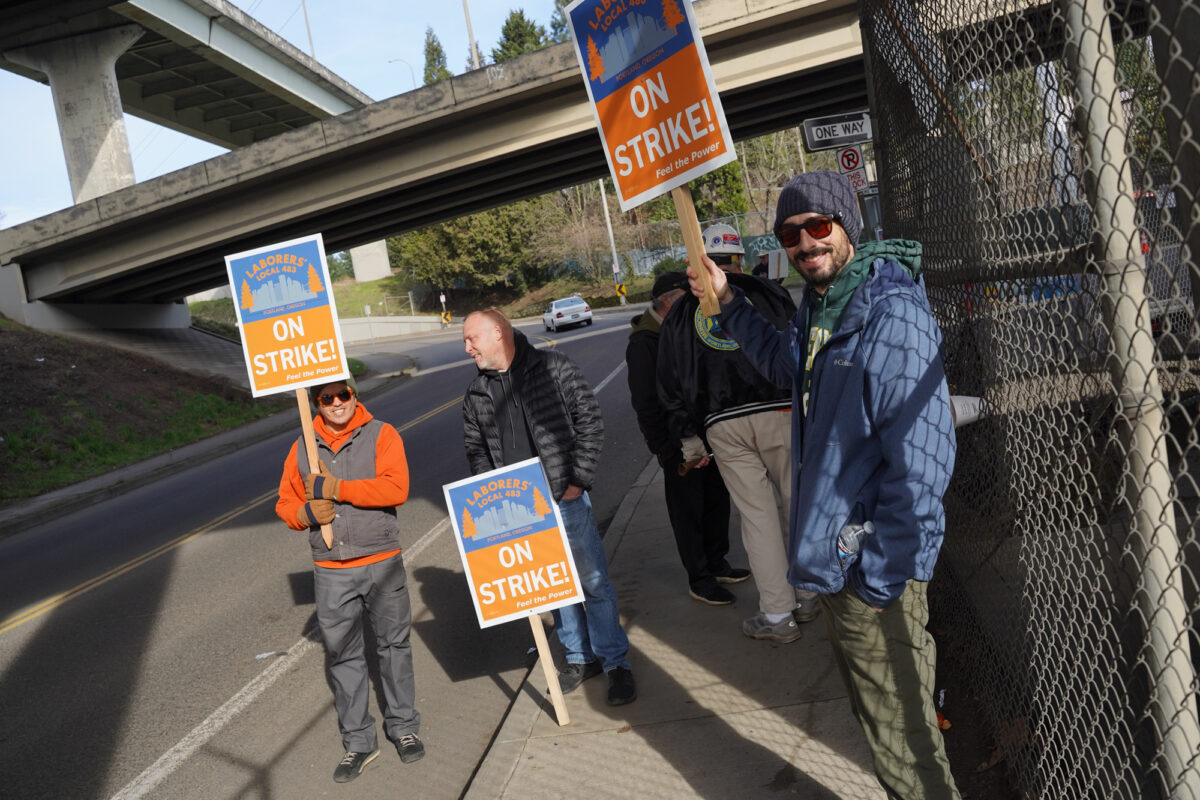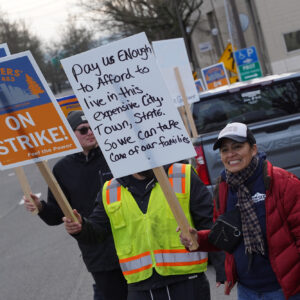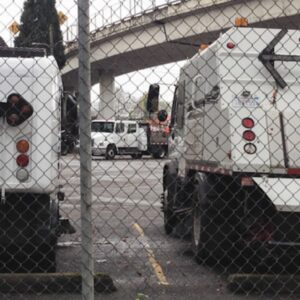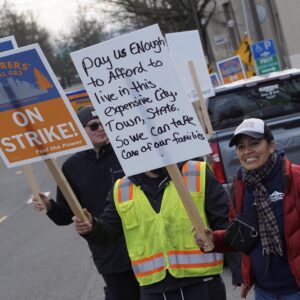
City of Portland transportation, parks, and environmental services workers from Laborers’ Local 483 went back to work last night after a three-day strike that began last week. Staff from the City of Portland and Laborers’ 483 were in negotiations all day Saturday, finally reaching a tentative agreement on a new contract at 1:00 am on Sunday morning. This puts an end to 10 months of negotiations between the union and the city.
BikePortland covered multiple events leading up to the strike, starting back in September when a Portland Bureau of Transportation traffic crew member and Local 483 leader testified at a City Council meeting to ask for Council support in their contract negotiations. As deadlines for negotiations came and went, it looked more and more likely that a strike was imminent. Finally, union members announced their intent to strike at the end of last month, and picketing began last week.
The main issue for union members was that the City of Portland wasn’t paying them enough and was being stingy with cost-of-living adjustments (COLAs) that didn’t rise to employee needs in a time of historic inflation. Local 483 members didn’t believe the city’s claims that they didn’t have the money to meet union demands. During the bargaining process, BikePortland talked to union Field Representative and Organizer James O’Laughlen, who said the city claiming poverty was only going to make things more expensive down the line. He described the situation as a “loop of crisis” that was hurting city infrastructure.
In the end, the city came up from an initial offer of a 1% annual raise to a 3% annual raise (the union asked for 3.5%).
As we explored with maintenance staffers at the picket line last week, a prolonged strike would’ve had major infrastructure impacts, and Portlanders who rely on biking and active transportation to get around would be some of the first to feel those street-level effects. Luckily, they reached an agreement after only a few days.
“We look forward to reuniting with our colleagues and celebrating the ability to continue serving this community, together,” a joint statement from the City of Portland and Portland City Laborers Local 483 reads.
This was the City of Portland’s first strike in 20 years. Even though it only lasted three days, its impacts may be more long-lasting.
“During the coming days, city bureaus affected by the strike will be catching up from a backlog of work that was put on hold to prioritize essential services. They will also focus on building community among employees who remained at work and those returning from the strike,” a Sunday press release from the City of Portland states.
The new contract will be in place until 2026, and includes retroactive across-the-board wage increases and annual COLAs. The contract will still need to be approved by Local 483 and City Council votes before it can be finalized. You can read full details of the tentative agreement at the Laborers’ Local 483 website.







Thanks for reading.
BikePortland has served this community with independent community journalism since 2005. We rely on subscriptions from readers like you to survive. Your financial support is vital in keeping this valuable resource alive and well.
Please subscribe today to strengthen and expand our work.
I, for one, am looking forward to getting my street swept this July (or September, or whenever, ifever).
What’s a good example of a city that has expenses going up and revenue (sources of revenue in particular) going down and everything worked out fine?
My yearly tax bill, property and income, keeps going up and up. I only wish mine would go down!
Upzoning and land value tax would solve this.
In the face of insatiable demand to live in Portland, maybe, but that ship has currently sailed. Looked at the apartment absorption data for Portland lately, particularly relative to what’s under construction?
Looked at the rental vacancy rate lately? Last year it was 3.4%, the lowest since 2015. A healthy rate is around 7–8%. Supply is not keeping up with demand, but the fearmongering media won’t tell you that.
What a relief. I was worried about the city looking trashy.
Nice, strikes work. Glad they got (closer to) what they asked for.
It’s ridiculous the city made it come to this, up to and including the 1AM negotiations. These contracts don’t come up at unpredictable times, and the demands were not unknown.
I take it you’ve never negotiated for something: Labor contracts, political deals, used cars, salaries, the carpet I have in my bedroom — the final deal is only made when everyone understands that each other’s bottom line is, and it’s never the first price offered. Sometimes you need to let the pressure build to see what’s real and what’s bluster.
And yes, unions are very good at this game.
I expect the people who are my government to treat its workers with respect, essentially they’re paid by me. And I expect them to give reasonable raises. They knew what the union was demanding, and they never would have gone on strike if they were simply given the offer they ultimately accepted. It did not need to come to a strike, a strike is when you actually failed at negotiating. That’s not negotiations gone right.
If one party always got what they demanded on the first go-round, there’d be no limiting what they ask for. The first offer is never the real offer.
A strike is a way of signaling “this is really our bottom line”. It was resolved quickly and without apparent drama so I’d say it was a little messy but it worked out.
To round out the picture, I’d like to know what PBOT will be doing less of moving forward. There are plenty of things I wouldn’t mind cutting, but I’d like to know that bicycle projects won’t be reduced to pay for the salary increases (however deserved they may be).
A city tax on spray paint could finance COLA adjustments
Add in blue hair dye and we’d have a budget surplus…
Well done to the workers! Now can we please get our bike lanes swept??
Oh, I guess not – things are back to normal.
This didnt even meet inflation, the union failed them.